Key takeaways:
- Wildlife conservation is vital for ecosystem balance, emphasizing our collective responsibility for protecting species and habitats.
- Marine habitats are crucial for climate regulation, food security, and community protection against natural disasters.
- Challenges such as pollution, overfishing, and climate change threaten marine ecosystems, highlighting the need for sustainable practices.
- Effective habitat management strategies include community engagement, marine protected areas, and integrating technology for data-driven conservation efforts.
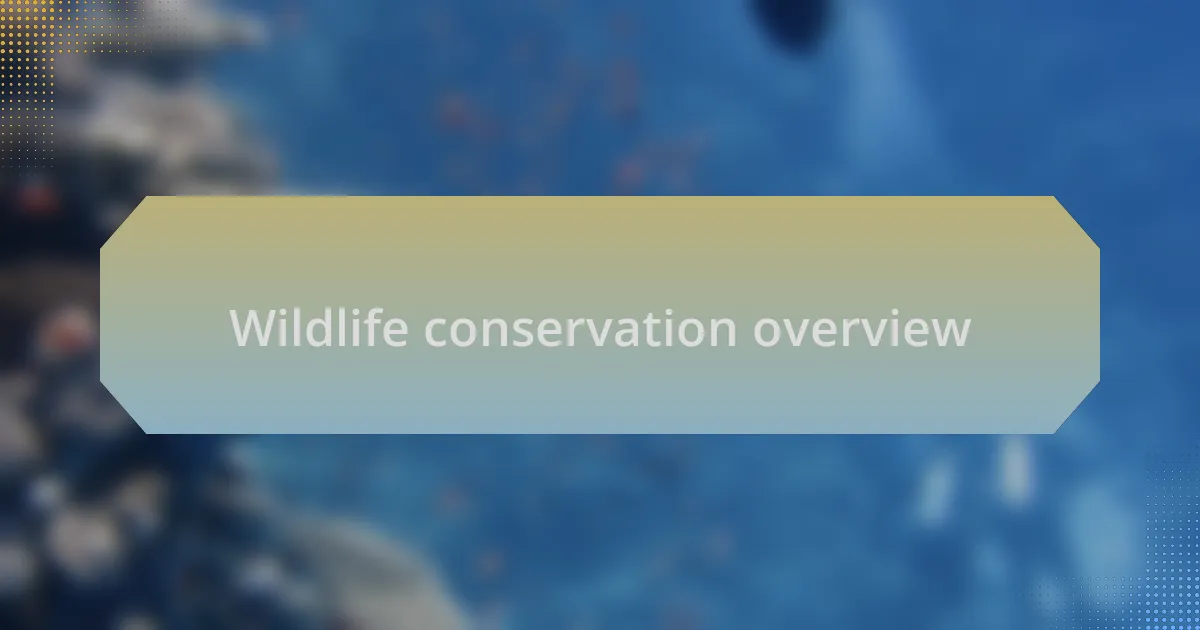
Wildlife conservation overview
Wildlife conservation is an essential practice that seeks to protect the delicate balance of our ecosystems. I’ve often found myself reflecting on the awe I felt during a visit to a coastal reserve, where I witnessed the intricate interplay of species. It made me wonder: how often do we truly appreciate the beauty and importance of the wildlife around us?
This field encompasses a broad range of efforts, from habitat preservation to species recovery programs. I remember learning about the tireless work of conservationists who dedicate their lives to these important causes. Their passion illuminates the path we must continue to tread, reminding us that every small victory—like the resurgence of a threatened species—speaks volumes about our collective responsibility.
As we delve deeper into the nuances of conservation, it’s crucial to realize that our actions today will dictate the future of our natural world. Have you ever considered the impact your choices can make? Every decision—big or small—affects wildlife and their habitats, urging us to become more conscious stewards of the Earth.
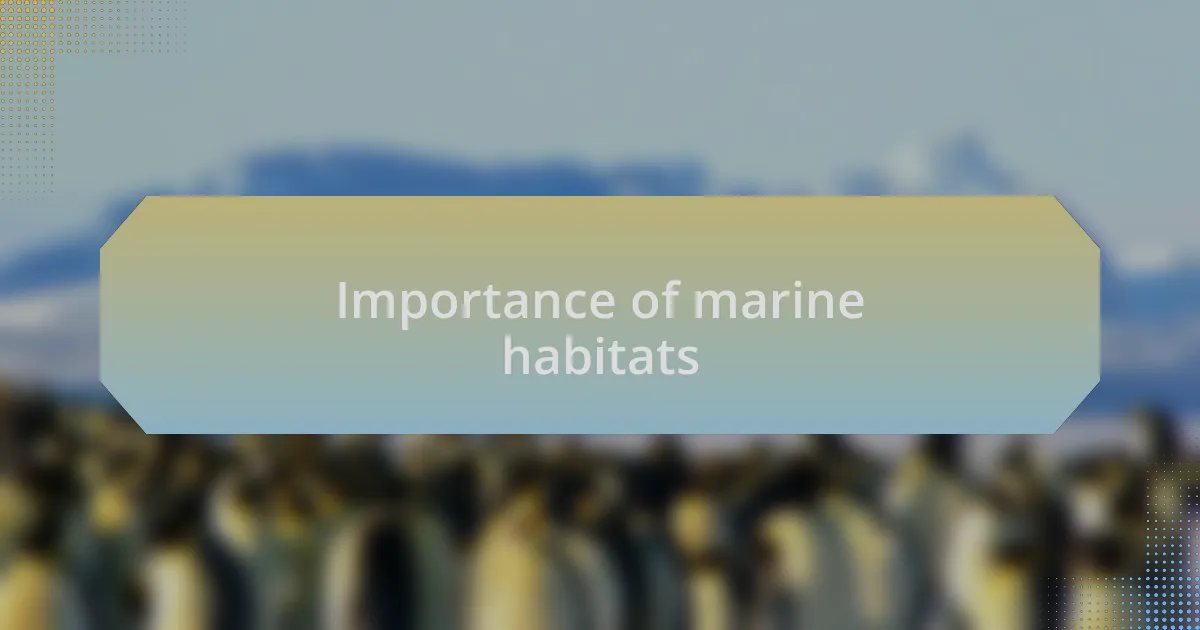
Importance of marine habitats
Marine habitats play a critical role in maintaining the health of our planet. During my time snorkeling in a coral reef, I was struck by the abundance of life thriving in the vibrant ecosystem. It’s fascinating to think that these underwater gardens not only support countless species but also help regulate our climate by absorbing carbon dioxide.
I’ve come to realize that marine habitats are vital for our food security as well. Many coastal communities rely on fish and other seafood for their livelihoods. I remember speaking with a local fisherman whose family had fished the same waters for generations. His concern about declining fish populations made me appreciate just how interconnected our lives are with marine ecosystems.
Furthermore, these habitats are natural barriers against storms and erosion. I witnessed the power of mangroves during a cyclone when they shielded the coastline. It raises an important question: what would happen to our communities if we lost these protective systems? The reality is that preserving marine habitats is not just about saving wildlife; it directly impacts human safety and well-being.
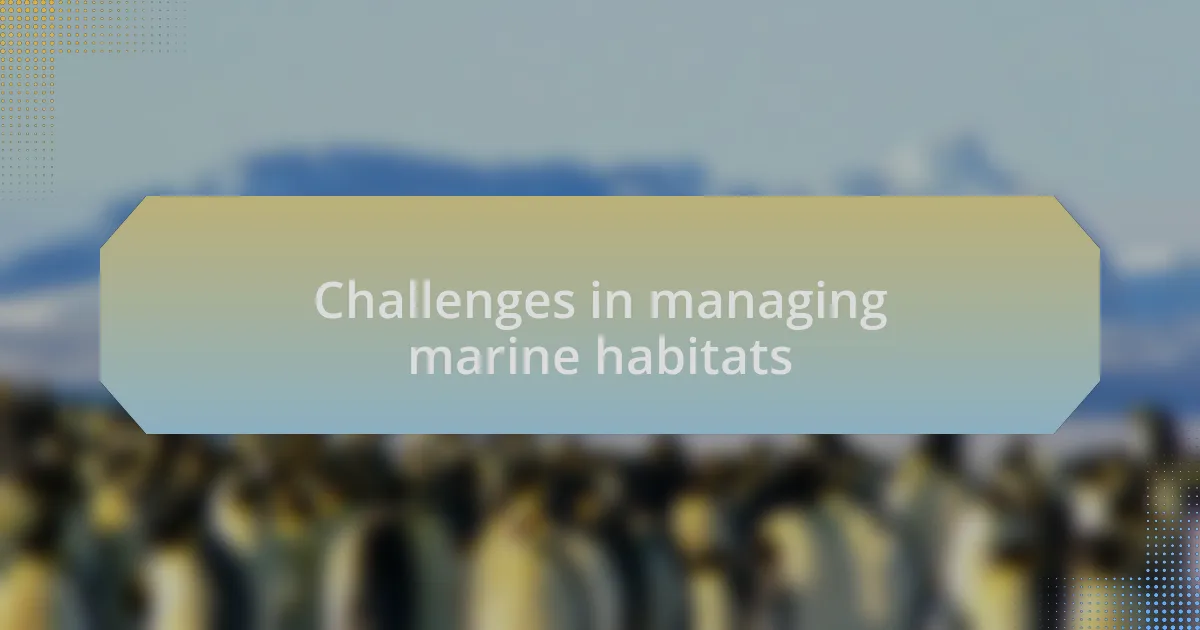
Challenges in managing marine habitats
The management of marine habitats faces numerous challenges, with pollution leading the pack. I once kayaked through an area littered with plastic waste, and it was disheartening to see how human activities tarnish the beauty of these ecosystems. What struck me the most was that every piece of trash tells a story of neglect, highlighting the urgent need for cleaner practices.
Overfishing is another significant hurdle we must overcome. During a diving trip, I encountered a once-thriving reef, now diminished because of unsustainable fishing practices. It made me wonder: how can we balance our appetite for seafood with the responsibility to protect these underwater treasures? The reality is that we must advocate for sustainable fishing regulations to ensure future generations can witness the marvels of marine life.
Additionally, climate change poses an existential threat to marine habitats. I recall an educational tour where we observed coral bleaching first-hand, a stark reminder that rising sea temperatures compromise not only biodiversity but also local economies relying on tourism and fishing. It’s a sobering thought, but we need to ask ourselves—what steps can we take to combat climate change and safeguard the oceans we cherish?
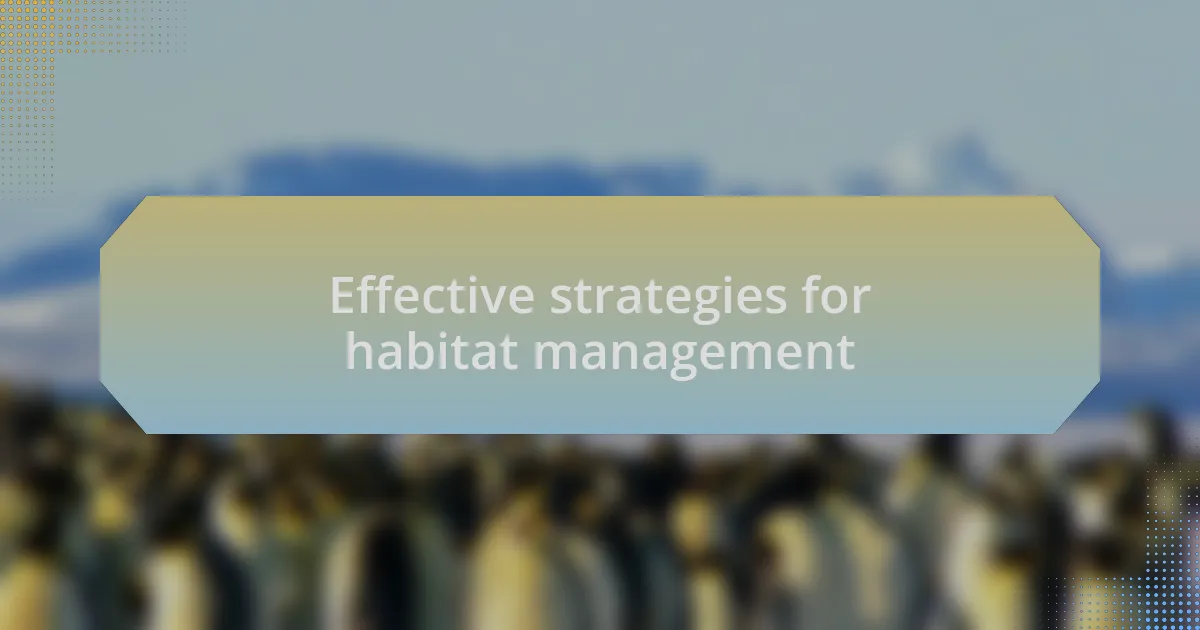
Effective strategies for habitat management
When I think about effective habitat management, one approach that stands out is community engagement. On a recent trip to a coastal town, I witnessed how local volunteers transformed a polluted beach into a thriving marine sanctuary. Watching families come together to clean their environment left me pondering: how often do we overlook the power of collective action? Engaging communities not only fosters a sense of ownership but also encourages sustainable practices that can lead to lasting change.
Another effective strategy is the implementation of marine protected areas (MPAs). These designated zones allow ecosystems to recover and thrive without the pressures of overfishing and pollution. I remember visiting an MPA where vibrant marine life flourished, a contrast to nearby unprotected areas facing depletion. It was an affirmation of the idea that if we give nature the space to breathe, it can regenerate. Could this be the missing piece in our conservation puzzle?
Furthermore, integrating science and technology into habitat management can amplify our efforts. For instance, I participated in a project using drone technology to monitor coral health and assess damage from climate events. Witnessing this firsthand made me realize that data-driven decisions can optimize our conservation strategies. Are we tapping into the full potential of technology to protect our precious marine habitats? The answer is a resounding yes—it’s time we embrace innovative solutions to ensure a sustainable future for our oceans.
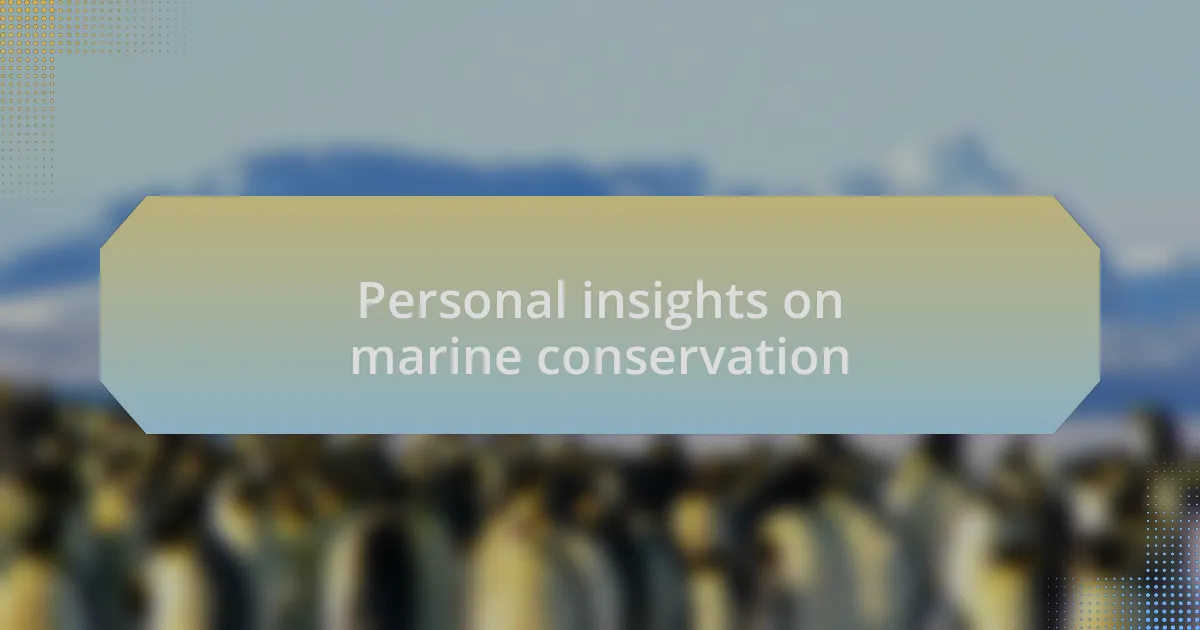
Personal insights on marine conservation
When reflecting on marine conservation, I often think about the profound impact of educating younger generations. I recall an afternoon spent with high school students at a coastal science camp, where we explored the delicate balance of marine ecosystems. Their curiosity and genuine concern made me hopeful for the future; how can we ensure this passion for the ocean persists as they grow? This reinforces my belief that education is a key pillar in fostering a culture of conservation.
Another important insight I’ve gathered over the years relates to the interconnectedness of marine life. During a scuba diving trip, I witnessed the staggering beauty of an ocean floor carpeted with diverse species. This visual experience solidified what I intellectually knew: every species plays a role in maintaining balance. If one disappears, it can lead to a chain reaction affecting many others. What would happen if we lost iconic species like sea turtles? It’s crucial that we recognize our responsibility in protecting these interconnected ecosystems.
Lastly, I’ve come to appreciate the significance of storytelling in marine conservation. One evening, while sharing my passion for ocean health at a community event, I noticed how captivated the audience was by personal narratives. It dawned on me that these stories humanize the conservation cause and illustrate the stakes involved. Why do stories resonate so deeply? They connect us emotionally and inspire action, driving home the urgency for long-term solutions in protecting our oceans.
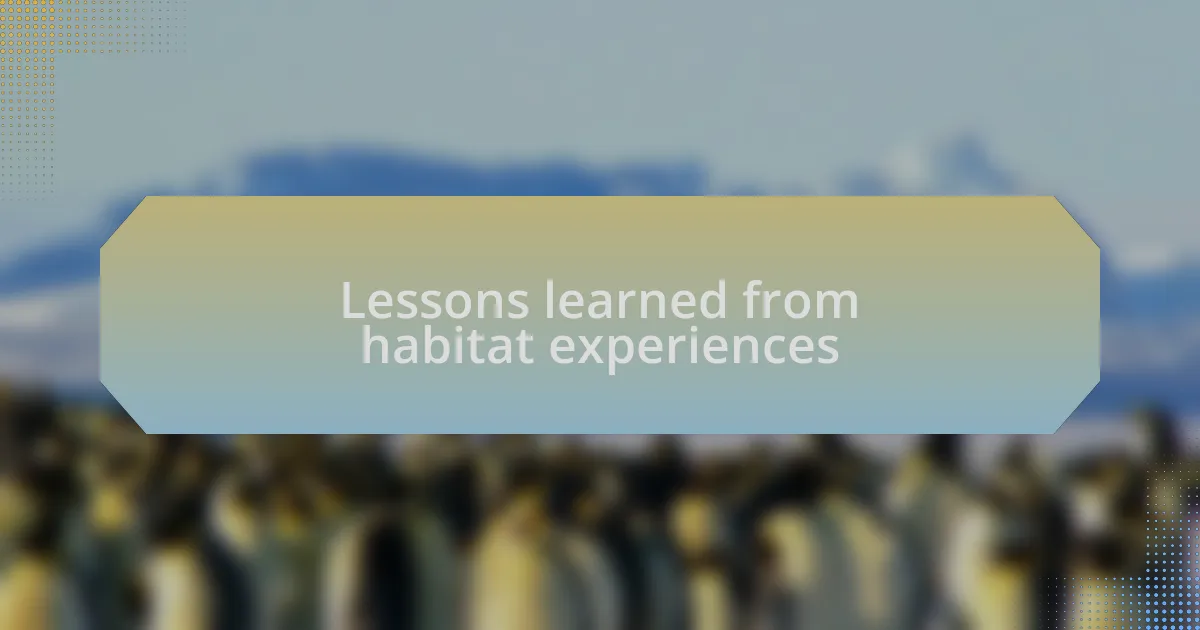
Lessons learned from habitat experiences
Experiences in marine habitat management have taught me that local community involvement is vital. I remember collaborating with fishermen on a reef restoration project; their intimate knowledge of the waters transformed our strategies. It made me wonder: how often do we undervalue the expertise of those who interact with these ecosystems daily? Their insights proved crucial to our success.
Another lesson that stands out is the importance of adaptability in conservation efforts. I once participated in a project aimed at protecting fragile mangrove areas. Midway through, we faced unexpected storms that reshaped the landscape entirely. It was a humbling reminder that nature can be unpredictable, prompting me to question how we can better prepare for such challenges. Flexibility not only keeps projects afloat but often leads to innovative solutions we hadn’t considered.
Moreover, I learned that metrics alone don’t paint the full picture. While collecting data on fish populations, I experienced frustration when numbers fluctuated without clear reasons. This triggered a realization: what we measure must be complemented by understanding the underlying environmental factors. Are we truly capturing the health of an ecosystem if we only focus on numbers? Blending quantitative data with qualitative insights is essential in crafting effective management strategies.
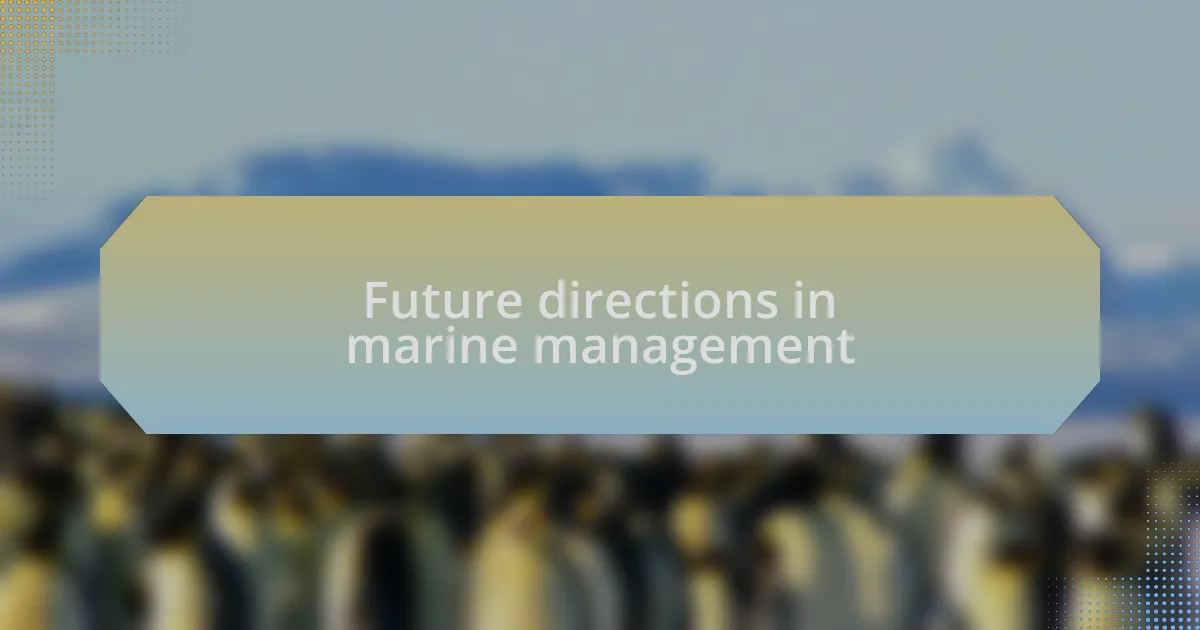
Future directions in marine management
As I reflect on future directions in marine management, I believe integrating technology is key. During a recent workshop, I saw firsthand how drone technology can monitor coral reef health efficiently. Imagine using real-time data to track changes in our marine ecosystems—it’s an exciting prospect that could revolutionize how we approach conservation. How often do we consider the potential of emerging technologies to enhance our understanding?
Another crucial avenue lies in fostering stronger global collaborations. I participated in a conference where scientists and policy-makers from different countries shared their innovative strategies for managing shared ocean resources. The diversity of ideas sparked a thought: if we unite our efforts across borders, could we create a unified approach that truly benefits all marine environments? This sense of collective responsibility can amplify the impact of our conservation methods.
Lastly, I can’t help but emphasize the importance of education and outreach. I once led a community workshop about sustainable fishing practices, and the enthusiasm was palpable. It struck me then that the more we educate and empower local communities, the more stewards we create for our oceans. How do we ensure that the next generation values marine conservation as deeply as we do? By embedding environmental education into our daily lives, we can cultivate a culture of care for our marine habitats.